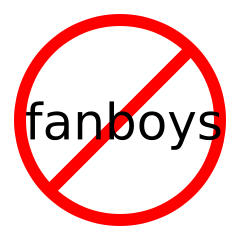 What makes TechCrunch a property that attracts some 10 million unique users a month is diversity. We cover tech single-mindedly but from a lot of different perspectives. So it’s from that stance that I’m writing this post.
What makes TechCrunch a property that attracts some 10 million unique users a month is diversity. We cover tech single-mindedly but from a lot of different perspectives. So it’s from that stance that I’m writing this post.
I have a confession to make: With all due respect to my colleague Mr. Siegler—who I should say writes more posts, drives more page views and hence creates way more value for this site than I do—I am not a fanboy.
I have no problem championing a business – even an unsexy or unpopular one. When I was at BusinessWeek I was one of the first people to write about a lot of Silicon Valley companies like Facebook, Yelp, and Digg, and over the last two years I’ve written here about even more unknown companies from around the world that I think have a shot at building something big and making the world a better place. That’s what I love about my job, and why I’ve done it for more than ten years.
But that’s not being a fanboy. I just can’t get excited about a stunning product if it doesn’t solve a core problem or make some sort of business sense. Product for sheer product sake is writing about technology in a vacuum.
That’s why I’ve been one of the only reporters to consistently question Spotify’s promises of near-term US launches and profitability. (Yep, still haven’t launched here, if you’re keeping track. We’re almost a year after the first “guaranteed” date, FWIW.) And it’s why– despite whiling away most of my time on my recent 20-hour international flights playing on the iPad– as a business reporter I’ve never thought the device would be an immediate mass market hit for one simple reason: As of now, it is a beautiful solution to an unarticulated problem. The first person I knew who had one gasped and said, “This is a product everyone wants they just don’t know it yet.” Exactly.
Contrast that to other hits from the Steve Jobs, part two era: The original iMac. It didn’t start a new category but solved a core pain point of allowing people to easily connect to the Internet but plugging in just one wire. The iPod. There were dozens of MP3 players, but Apples hardware and the iTunes solution produced the first device where you could stylishly, easily and affordably carry around all your music with you, wherever you went. The iPhone. Again, plenty of smart phones on the market, but Apple fundamentally reworked the Web experience so that it was a new thing optimized to being a handheld device, not a shrunken computer.
The iPad is a beautiful toy and as a user, I’m glad I spent the money on it. But until developers do more than upload widescreen versions of iPhone apps and give this thing a reason people who don’t just love Apple have to buy it, it’s just a beautiful toy. It doesn’t solve world peace or even a basic problem like the earlier Apple devices did. I’d argue the closest to a killer app is Netflix, but I spend about half my time out of the US where it doesn’t work. Next to that the most killer app is the battery life. I appreciate the stance on HTML5 but the bottom line is, that means I can’t view a lot of sites right now, especially media sites. That’s frustrating for a Web-centric device.
Finally, some numbers actually back up this oh-so-controversial view that the iPad is merely a great product. A report was released yesterday from market research firm YouGov that showed that a whopping 98% of iPad buyers own another Apple device and 57% own two or more Apple devices. What’s more—79% of non-iPad owners the firm surveyed said they definitely or probably would not buy one and another 14% said they were unsure. From the release: “Most say they just don’t know what they would do with the device that they do not already do on another computer or mobile device.”
Unlike the other hits of the Jobs era—this is so far not a device that reaches across the aisle. Why didn’t I write about this yesterday when the report came out? Well, usually TechCrunch and every other blog over-cover anything Apple so I try to cover other stuff. But curiously, almost no one wrote about this. (Kudos to Eric Savitz of Barrons who is always willing to jump in front of fanboy fire, although he thinks numbers aside, YouGov underestimates the device’s appeal.)
Whether you think the conclusions from the research are right or wrong this is important from a technology business point of view because Apple is now the most highly valued tech company in the United States. It is priced at absolute perfection– from a business, not product point of view. There are huge ripple affects for developers who make their living coding for Apple products, not to mention people buying the stock at this price. It deserves at least discussion.
Being a fan of products is great. I totally agree that in today’s media world knowing how an author feels about a product is relevant. But when these things kill our ability as reporters even to consider independent research, we’re not doing anyone—readers, developers, investors, and even the companies we cover—any good whether we love the product as individuals or not. Embracing the fanboy mantle? Too much of a slippery slope for me.